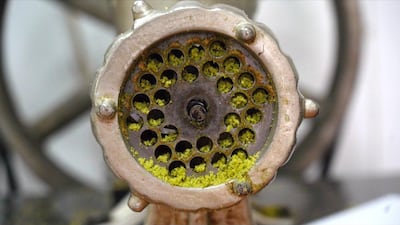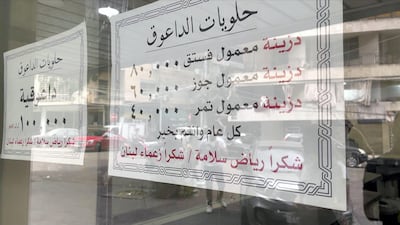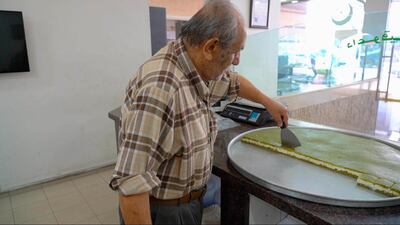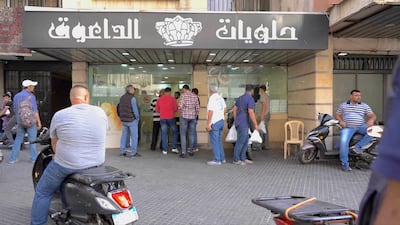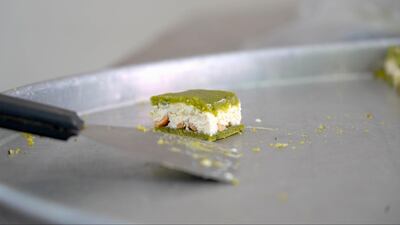Every day before iftar people from across Lebanon queue outside a small shop in central Beirut to buy one of the capital's most renowned Ramadan desserts – the Daoukiye.
Named after its creator, 76-year-old sweets master Mohammed Al Daouk, the delicacy consists of fluffy cream and cashews, sandwiched between two layers of emerald-green pistachio paste.
In the past few decades, Daoukiye has become a fixture of Ramadan and one of the rare desserts associated with Beirut.
The coastal cities of Sidon and Tripoli often outshine the capital with their sweet treats.
Mr Al Daouk said his customers named the dessert after him.
“It’s an honour to have a dessert in my name.
“I feel like a king here, this place makes me happy,” Mr Al Daouk said.
Ahead of Eid festivities, staff are hard at work at Al Daouk Sweets, smoothing down pistachio paste and making Eid maamoul – a butter cookie filled with nuts or dates.
Sweet treats are synonymous with the holy month and shops look forward to this time of year for their best sales.
But this year, rampant inflation in Lebanon has made handcrafted sweets a luxury many cannot afford, taking a toll on local shops and a longstanding tradition.
"At this time of year in the past, clients used to fill the shop," Mr Al Daouk said, gazing at the near-empty counter.
"We used to get calls from people asking us if there was space in the shop because it would get so crowded."
A fisherman and professional hunter turned sweets master, Mr Al Daouk says he invented Daoukiye by accident when a friend asked him to make an earlier version of the dessert that only had one layer of pistachio.
"He told me if you produce the dessert like this, [with two layers] it will become huge in Lebanon," he said.
Daoukiye now makes up 90 per cent of Mr Al Daouk's sales.
A trickle of customers queue in the street. One is a young woman who said she came all the way from the southern city of Sidon to buy two kilograms of Daoukiye.
A man in his fifties with a Beiruti accent told The National the dessert was now "part of Beirut's heritage" and Lebanon's best sweet treat.
This Ramadan, the dessert took Lebanon by storm again after Mr Al Daouk's son Ahmed put up a sign in the window with its new price, showing it has quadrupled since last Ramadan.
"Thank you to Lebanese politicians," he wrote below the new pricing, taking a swipe at the political class who are widely blamed for the ongoing economic crisis.
One kilogram of Daoukiye used to cost 24,000 Lebanese pounds ($16) before the crisis.
It now costs 100,000 pounds ($66 at the official rate) – about one-seventh of the minimum monthly wage.
Higher prices mean that many of Al Daouk Sweets' customers can no longer afford their delicacies.
"My wish for Eid is that everyone gets to celebrate properly," Mr Al Daouk said "But people can't even afford falafels."
Yet the dessert maker remains optimistic. He has begun exporting his signature treat to Dubai and says orders from the Gulf have offered his little shop a lifeline as the economy deteriorates in Lebanon.
"Thank goodness we're selling our desserts in Dubai now, it keeps our shop afloat," he said.
“God willing, the shop will not close.”

